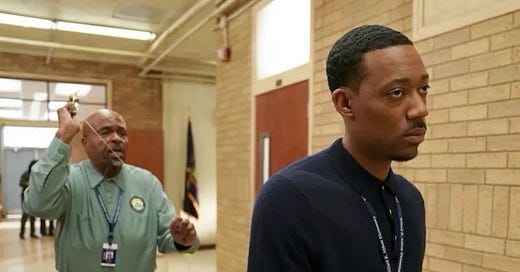There’s a strange obsession some women have with down-low men. Not abusive men. Not broke men. Not chronically lying men. Not men who weaponize incompetence, disappear during pregnancy, or casually commit economic sabotage in the name of love. No—the real danger, they say, is a man who’s secretly gay.
Apparently, the act of being cheated on, infected, lied to, manipulated, or humiliated only truly becomes dangerous when another man is involved. As if dick is only destructive when it’s been somewhere “unfeminine” first.
Because a woman can be publicly embarrassed, financially drained, emotionally discarded, and privately tormented by her straight man—and still turn around and date another one right after. She’ll rebrand her trauma as “bad luck,” call it “just how men are,” or pretend that Jesus and therapy will scrub the toxicity from the next one. But let her find out he sucked a little dick behind a Waffle House at 2 AM? Suddenly, she’s a pseudo feminist philosopher with concerns about trust, betrayal, and public health.
The down-low man has become the scapegoat for women who can’t face the more terrifying truth: men, period, are dangerous to women. Not because they’re gay. Not because they’re hiding something. But because male socialization doesn’t require them to be ethical toward women. Because straightness has never been a safeguard against harm—it’s just been the default setting for normalized abuse.
So when women obsess over DL men as “more dangerous,” they’re not sounding the alarm for safety—they’re outsourcing accountability. They’re clinging to the fantasy that somewhere out there exists a safe version of patriarchy. A man who will never betray them as long as he’s 100% straight, never experiments, and only consumes female-coded porn on a heterosexual device.
But that fantasy doesn’t exist. Because heterosexuality, in its unchecked form, isn’t safe either.
So why do women cling to the idea that down-low men are worse?
Because it keeps them from having to confront how many straight men are already fucking them over with full transparency. It’s easier to blame deception than to confront desire. DL men become the exception that proves the rule: “See? I only got hurt because he lied.” That narrative protects the belief that straightness is still the safest bet.
It’s Not About Safety. It’s About Shame.
It’s about optics. Control. Clean narratives. Because to date a man who secretly desires men forces women to ask uncomfortable questions about power, sexuality, and their own conditioning. It means admitting you can’t screen your way into safety. That emotional harm doesn’t just come from secrets—it comes from systems.
But most women don’t want to deconstruct systems. They want to feel chosen by them.
The obsession with “who’s DL” is just patriarchy in a different dress. It’s still male-centered logic. Still ranking men based on perceived access, desirability, and threat level without ever asking why the bar is underground to begin with.
It’s not radical to avoid gay men but still date liars. It’s not self-protective to obsess over DL behavior but ignore red flags from men who’ve never kissed another man. That’s not strategy—that’s selective homophobia laced with cognitive dissonance.
And just like how men care more about snitches and rats than they do about rapists or abusers, women obsessing over who’s down low—while ignoring male violence, cheating, or neglect—are performing the same selective moral outrage.
You are not safer with a straight man. You are just more familiar with the kind of danger he brings.
There’s a difference between risk assessment and projection. If you don’t trust men in general, say that. If you fear betrayal, own that. But don’t weaponize the sexual identities of men to create a false hierarchy of harm.
That’s not empowerment, that’s just internalized bigotry cosplaying as caution. No amount of femininity, loyalty, or performance will shield you from male betrayal. That you could do everything right and still not be enough—because it was never about you to begin with. And that truth is unbearable for women who built their self-worth on being “better” than the alternatives.




Some years ago I had to confront my own preferences and hesitance toward bi men. Just settled for “it’s just my preference.” But why? That “why” will force you to uncover prejudices you didn’t even know you had. Ways you subtly perpetuated patriarchal ideals. Unsettling but also an opportunity to further deconstruct the patriarchy.
bar after bar 💅🏻each sentence had me nodding along, thank you for sharing this piece